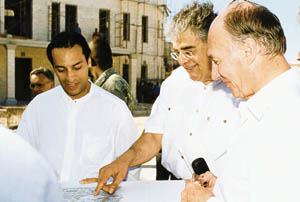 http://www.nationaudio.com/News/DailyNation/Today/News/News2202200357.html
http://www.nationaudio.com/News/DailyNation/Today/News/News2202200357.htmlThe Aga Khan (right) visits the Aga Khan schools complex site at Kilindini Mombasa with Mr Nizar Shariff (second left) and Mr Noor Esmail (left), two of the project consultants.
He said the centres, which would be international and indigenous, would help mould the youth into leaders of tomorrow.
"Africa and the developing world can help create centres of educational excellence that will, at the same time, be international and indigenous, and that will help mould young men and women from all walks of life and all parts of the world into the leaders of tomorrow," he said.
The Aga Khan, who is the Imam (spiritual leader) of the Ismaili Muslims, yesterday evening completed his visit to two major education campuses being developed by the Aga Khan Education Service (AKES) in Kenya.
Following an extensive tour of the site of the Nairobi campus to be set amid coffee plantations on the edge of Nyari Estate, he toured the Aga Khan Academy in Kilindini on a south-western promontory of Mombasa Island.
Already revealing the intricate outlines of a Swahili village, the 4.1 hectare Kilindini campus will integrate classrooms, libraries, state-of-the-art science and language laboratories, playing fields and a swimming pool into a fully networked, Internet-enabled academic environment.
Landscaped amid ancient baobab trees, overlooking the Indian Ocean, the school complex is designed, like others under development, by leading international and local architects.
In addition to Nairobi and Mombasa, other cities already designated locations for centres of excellence are, Antananarivo in Madagascar, Dar-es-Salaam in Tanzania, Dhaka in Bangladesh, Kampala in Uganda, Khorog in Tajikistan, Maputo in Mozambique, Mumbai in India and Osh in the Kyrgyz Republic. These private, non-denominational institutions will admit students from the pre-primary to higher secondary levels on a merit-based, means-blind basis. They will offer both national and international curricula. In addition to subsidising the costs of high quality education, each centre will offer scholarships for qualifying students.
Centres of this kind will allow institutions of the Aga Khan Development Network (AKDN), with their emphasis on school improvement and professional development, to combine the experience of teaching and learning in the developing world with access to resources of the developed world.
The Institute for Educational Development of the Aga Khan University (AKU-IED), established in collaboration with the Universities of Oxford and Toronto, hopes to add its presence to these campuses through on-site professional development centres. These campuses will also benefit from a decade-long International Academic Partnership (IAP) between AKES, AKU-IED and a leading US institution, Phillips Academy, Andover, Massachusetts.
The centres of excellence will be supported by AKDN educational institutions, ranging from AKUíscampuses in Asia, Africa and Europe, the University of Central Asiaís three campuses and the Aga Khan Trust for Cultureís humanities project, its music initiative, its global electronic community, ArchNet, and educational programmes at Harvard University and the Massachusetts Institute of Technology.
AKES operates more than 300 educational institutions and programmes reaching more than 54,000 students in Africa and Asia.
The Aga Khan, who has held extensive discussions with President Mwai Kibaki and senior government ministers during his visit, left Kenya yesterday.